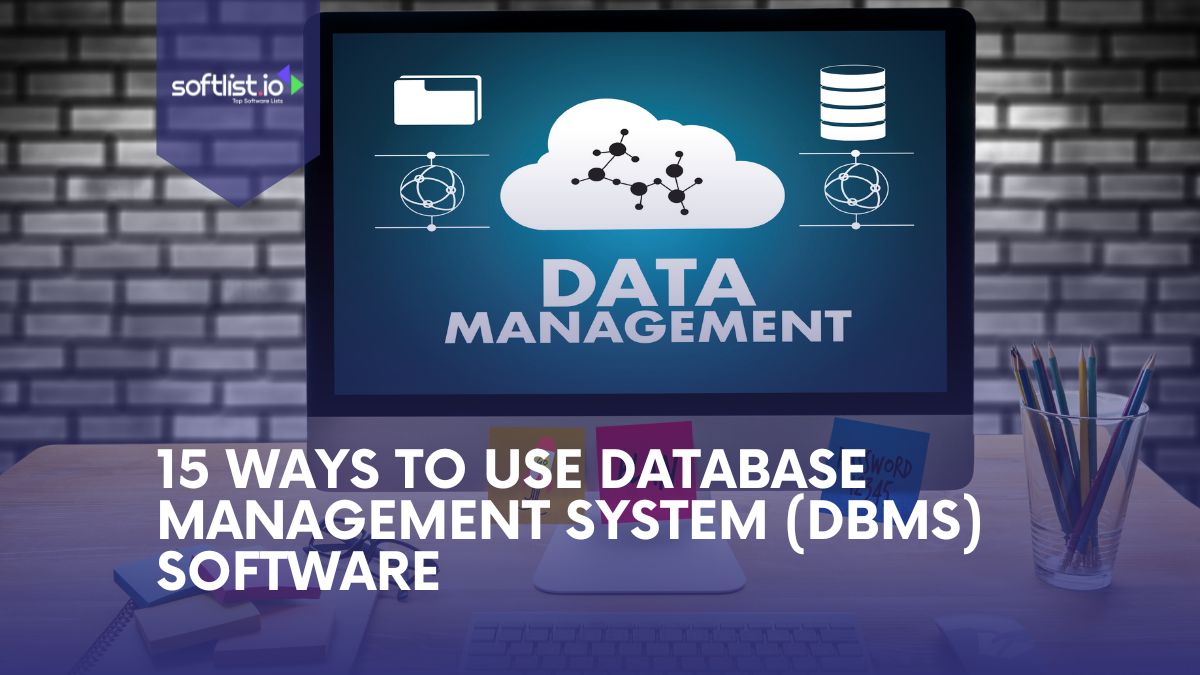Do you need help keeping track of your business’s information? Do you want to improve your workflow and create the most of the resources you have? You may find the answer in database management software. This powerful tool could make it easier for you to sort, store, and find information.
It can help you run your business better. In this blog post, we will look at 15 different ways to use database management software to make your data management better and more efficient. Find out the different ways this cutting-edge technology can help your business. It can help build better customer relationships and make tracking of stock easier.
Database management software can help small and large companies obtain the most out of their data. So, please keep reading to learn more about this new technology and how to use it to improve your business.
1. Data Storage and Organization

Users can use DBMS to organize and store their info. This puts together a database performance of a vast amount of information. Database management tools need a place to store data.
It lets you put together information from different places in one place. This makes it easier to find and change data and allows users to see and modify data simultaneously, making it easier to work together. Organizing data in a relational database and management system (DBMS) lowers data duplication.
DBMSs eliminate duplicates and standardize data to improve data quality and storage capability. DBMS structure and rules make it easy for users to sort and group data quickly. They were sorting and organizing.
A well-organized database schema also makes it faster to ask questions and get reports, which makes it easier to make choices based on data. DBMSs store and organize data, making it faster and easier to work together and improving the data quality in many apps.
2. Enhancing Data Security
Database Management Software (DBMS) keeps private data from being accessed remotely, changed, or leaked by people who shouldn’t be able to. DBMSs use permissions and advanced authentication to ensure that only authorized users can view data.
This keeps the info safe. Encrypting data while it is at rest and while it is in transit lowers the risk of unauthorized access even more. DBMSs let you control entry at an excellent level.
Admins can set up user jobs and permissions to limit what users can do and what data they can see based on their roles. This level of control stops data from getting out and only lets allowed users see private data. DBMSs make it easier to keep track of and check users. This makes it easier to spot strange behavior and security problems and deal with them.
DBMSs automatically back up data and offer ways to recover from disasters so that data is safe. Protect info. DBMSs improve data security. This keeps businesses’ information safe and builds trust.
3. Improving Data Accessibility

DBMS simplifies database data entry, retrieval, and modification, improving user experience. It makes it easier to find information. An affordable database management system (DBMS) that is easy to use lets you change data quickly, even if you need to learn more about database design or computer languages.
A DBMS makes it easier to find and query large amounts of data. The team can work together on data that everyone can view simultaneously. This helps people work together and get more done.
Many different programs, systems, and data formats can be used with the best database management software. The process is sped up by making it easier for programs to work together and giving people access to data through their chosen technologies.
Businesses can use data-based ideas in various industries and situations with an easy mixture. DBMSs can set up access rules that ensure data is easy to get to and safeguard private information.
The main thing that DBMSs do is make it easier to get to data. More data helps improve business success, collaboration, and decision-making.
4. Data Integration
Database Management Software A Database software (DBMS) puts together information from different sources, forms, and systems in a way that makes sense and is easy to use. A database management system (DBMS) keeps track of the different types and forms of data.
This database engine makes it easy to combine and analyze data. DBMSs use standard data models and standards to ensure that all the data is the same. With this method, it’s easy to use data to make choices. By making data integration more accessible, a DBMS makes it easier for applications, networks, and teams to share information.
When people work together better, things run more smoothly. Organizations can choose whether to combine data in real-time or in batches as the best way to do it. They are keeping information current and valid for when it’s needed.
Integration gets rid of data gaps, which can make it harder to make choices and run a business. By getting rid of these problems, a database management system speeds up the integration of data. It can then be used for innovation and growth. Ultimately, data integration lets businesses use their data tools and DBMSs to make better strategic decisions.
5. Ensuring Data Consistency and Integrity

For DBMS to keep information in a way that is accurate, reliable, and free of mistakes, it needs consistent and correct data. Rules, links, and boundaries ensure that data in a database is accurate.
A database management system (DBMS) ensures mistakes don’t happen. ACID-based transaction control makes sure that data is correct. (Atomicity, Consistency, Isolation, and Durability).
This makes sure that database events are treated correctly and dependably. The data is kept secure when the database is safe from hardware failures, system crashes, and other mistakes. DBMSs use concurrency control so that multiple people can make changes. It can use the database at the same time. This keeps the same information and stops trouble.
Data security is better by validating, cleaning, and getting rid of copies of data regularly. It helps find problems and fix them. DBMSs make sure that data is correct and don’t change. This technology makes it easier for businesses to keep track of their data and make decisions based on accurate information.
6. Efficient Data Management
Database Management Software (DBMS) helps companies keep track of their info quickly and effectively. DBMSs ease data storage, retrieval, modification, and organization.
A DBMS puts all the data in one place so that it is easy to see and control. This makes it easier to handle data. Sorting and splitting material helps people find it quickly. DBMSs make it easier to back up, update data, and check data protection.
This saves time and money that can be used on more critical tasks. DBMSs are flexible and cost-effective for all businesses because they can grow and change along with the amount of data and the company’s needs.
A DBMS makes it easier for people to share and work together on data because it lets more than one person use it simultaneously. It makes it easier to work together and make decisions. DBMSs also make it easier to handle data. This makes it easier to work with data, saves time and money, and helps data-driven companies do well.
7. Scalability
Database Management Software needs to keep getting better. (DBMS). It ensures the system can handle more data, change as business needs change, and grow. Scalable relational databases can hold more people and data without slowing down or losing accuracy or reliability.
Companies are constantly making, collecting, and studying vast amounts of data in today’s data-driven world. A DBMS needs to be able to grow with a business.
You don’t have to fix big problems or change the whole system to add new features, methods, and data types. When database management systems (DBMSs) can handle growth, it’s easier to plan for it. A database management system (DBMS) that can be scaled up or down lets a business add technology and resources slowly.
It can meet their current and future needs. This lets groups put their resources where they are needed the most. They can save money by buying more space than they need and only spending money when they have to. Modern analytics and business intelligence tools can be used by businesses with the help of scalable database management systems.
It can teach them something useful and give them new ideas. Scalability is a vital part of how well DBMS works. It helps businesses react to a data world that is constantly changing, get the most out of their resources, and grow.
8. Backup and Recovery
Database Management Software (DBMS) must back up and restore critical data if the system fails. With a DBMS, companies can set up regular backups of their most important data.
It can keep copies that are always up-to-date. Customers can meet their data protection needs by making backup schedules with DBMSs. DBMSs can also get back data that has been lost or messed up.
This fixes systems that aren’t working right, are corrupt, or are missing data. You can choose the best way to get your data back from choices like transaction log recovery and point-in-time recovery. Companies can avoid fines and damage to their image.
Businesses can escape problems by using DBMS features like backup and recovery, which make sure that data is always the same and reliable. Backups and restores must be built into DBMSs. It protects essential data and helps businesses get back on their feet quickly when problems happen.
9. Data Analysis and Reporting
Database Management Software (DBMS) lets companies look at their data and report on it so they can make decisions. DBMS searching allows users to look for patterns, trends, and connections in data. Database management systems (DBMSs) can look at, study, and make sense of data.
A DBMS lets users make custom results that are easy to share with other users. These reports can be changed to fit the goals of a company. DBMSs enable handling and reporting on data in real-time, which helps companies change quickly.
With DBMSs, firms can use predictive analytics and machine learning to find patterns, risks, and possibilities. These findings help companies improve their plans, procedures, and use of resources. This leads to growth and new ideas. A DBMS makes the most of data assets in a competitive market where decisions must be based on data.
By studying and reporting data, DBMSs help businesses gain a competitive edge.
10. Simplify Application Development
Database Management Software (DBMS) makes it easy for developers to make data-based products, share them, and keep track of them. A database management system (DBMS) makes dealing with a lot of data more straightforward, making growth more manageable.
DBMSs hide the fact that getting and managing data is a complicated process. With this, coders can focus on the app’s structure and how the user interacts. This makes the process of making apps faster and makes them better.
With DBMS APIs and language support, working with different programming systems and environments is easy. Developers like to use tools and languages that make writing more accessible and more flexible. A DBMS is already set up to keep data safe and make sure it is correct. You can create reliable, standard, and secure apps even if you don’t know how to code.
A database management system (DBMS) lets you build scalable apps. Data can be found and used with indexing, splitting, and caching. It will work better if an app can handle more info and users. DBMSs make it easier to make and handle apps that focus on data, which improves their efficiency, cost, and time-to-launch.
DBMSs make making apps easy. This means that coders need the right tools, frameworks, and help. Then they can create apps based on data that are stable, flexible, and good at what they do. In today’s challenging business world, reaching business goals and encouraging new ideas is essential.
11. Multi-User Support
One of the top 15 ways to use a DBMS is to serve more than one user. This feature lets multiple users talk to each other, manage databases, and view them.
When multiple people can access a shared database simultaneously, it makes it easier for people to work together and makes the database administrators and company run more efficiently. Users can’t write over data with DBMS record locking.
Administrators can also give different permissions to each person. It can limit their access to only the information and functions they need. Security helps protect data and hold people accountable.
Database management systems (DBMSs) that let many people use them help modern businesses make decisions based on data—workflows and working as a team help with this. So, for Database Management Software to work well, it needs to handle multiple databases and users.
12. Cost Savings
Database Management Software (DBMS) helps businesses save money, which is one of the 15 most important reasons why they use it. Good data in popular database management systems saves companies money by making storing, finding, and changing data easy.
With a DBMS, you don’t have to do data management tasks by hand. This reduces the cost of work and the chance of making a mistake. This means that organizations can quickly get information that is right and up-to-date. It helps them figure out what to do.
A DBMS also makes getting the most out of your resources easy. Less storage space and hardware are needed, which cuts the cost of capital.
By putting all the data in one place, a DBMS cuts down on the amount of duplicate and irregular data. In the long run, this saves time and money. A well-made DBMS also improves data integrity and security, lowering the risk of data breaches and possible financial losses.
A DBMS helps the bottom line of a business by cutting costs. Because of this, it is an essential tool for all kinds of companies.
13. Streamline Business Processes
Database Management Software (DBMS) is a vital computerized data-keeping system that enhances business efficiency by centralizing data storage and control. By offering unified views of a single database, a DBMS enables teams across an organization to access, share, and analyze data seamlessly. This centralized approach fosters better communication and collaboration, allowing teams to make faster, data-driven decisions, thus accelerating workflows and eliminating bottlenecks.
A DBMS also automates repetitive tasks, such as data entry and report generation, reducing manual effort and freeing employees to focus on strategic initiatives that add value to the business. Additionally, it ensures data accuracy and consistency, minimizing errors that could disrupt processes or lead to poor decision-making.
For organizations managing data across different databases, a DBMS provides tools to integrate and streamline operations, ensuring smooth interoperability. Modern systems often include interfaces for querying the database with a human-like language, making data access and management more intuitive for users. Furthermore, changes made to a database are tracked and managed efficiently, ensuring data integrity and transparency.
By leveraging a DBMS to improve processes and reduce redundancies, businesses gain a competitive edge while fostering innovation and productivity.
14. Compliance and Regulatory Requirements
A database management solution (DBMS) plays a critical role in helping businesses comply with legal and regulatory requirements, especially when handling sensitive information such as customer details, financial records, and intellectual property. By centralizing data storage in a secure storage system, a DBMS ensures that sensitive data remains safe and confidential while adhering to industry standards.
A robust database system provides features like access control, encryption, and auditing to simplify compliance efforts. It enables businesses to establish role-based permissions, ensuring only authorized users can access sensitive information. This minimizes the risk of data breaches, loss, or misuse. These systems are often used by database administrators to monitor data usage, manage user access, and track changes, ensuring transparency and control.
In environments requiring a distributed database, a DBMS maintains consistency and security across multiple locations, enabling businesses to manage their entire database seamlessly. Additionally, the platform supports data retention policies that allow firms to archive, retain, or delete data as required by legal and regulatory frameworks.
As a comprehensive data management platform, a DBMS not only simplifies compliance but also safeguards a company’s reputation, avoids costly fines, and fosters trust among customers and stakeholders.
15. Ensuring Data Consistency

The quality and reliability of business decision-making information are directly influenced by the consistency of data within a database, a core feature of Database Management Software (DBMS). By providing centralized access to the database, a DBMS eliminates the inconsistencies that can arise when data is spread across multiple systems or files, ensuring a single source of truth for organizations. This streamlined approach enhances data organization, leading to more informed decisions and improved outcomes.
A robust database that offers features like primary keys, foreign keys, and unique constraints ensures the integrity of data. These mechanisms prevent invalid or inconsistent information from being introduced, maintaining data accuracy even after updates. Additionally, transaction management within a DBMS ensures that database operations either complete successfully or roll back entirely, preserving data consistency even in cases of system failures or high user activity.
As a comprehensive management platform, a DBMS not only organizes and secures data within a database but also improves business efficiency by fostering trust in the data and ensuring its correctness and consistency across all processes.
Final Thoughts
Efficient data handling is at the core of modern technology, and database management system (DBMS) software plays a vital role in achieving this. From organizing data structure to facilitating seamless communication between end users and software programs, DBMS software is indispensable for the creation and management of robust databases.
Whether you’re working with an in-memory database for speed or managing different types of databases for various applications, these systems ensure the efficient management of data. A single database can support multiple operations, aligning the structure of the database with your business needs.
With applications in operating systems, database services, and software development, DBMS software provides unmatched versatility. Explore the full potential of these tools to optimize your workflows and unlock new possibilities for managing your data elements effectively.
Read our other informative blogs to learn more about the different software solutions. Our group of business software experts can assist you search for the best software for your business. Take the chance to improve your organization’s data management and take it to the next level.
Frequently Asked Questions
What Are the Best Practices for Using a Database Management System?
Best practices for using a database management system include regular backups, optimizing queries, ensuring data integrity, using appropriate indexing, monitoring performance, and implementing robust security measures to protect the data.
How Can a Relational Database Management System like SQL Server Assist in Managing Data?
SQL Server, a relational database management system, helps manage data by providing a structured environment to store, retrieve, and manipulate structured data using rows and columns. It supports complex queries, and transactions, and integrates with various applications to provide robust data management solutions.
What Is the Difference Between Relational and Non-relational Databases?
Relational databases store data in structured tables with predefined relationships, using SQL for data management. Non-relational databases, or NoSQL databases, can store unstructured or semi-structured data, offering more flexibility in data models, and are often used for large-scale distributed data storage.
Why Is Oracle Database Considered One of the Best Database Management Systems?
Oracle Database is considered one of the best database management systems due to its comprehensive feature set, high performance, scalability, strong security features, and support for various data types and applications. It is widely used in enterprise environments that require robust data management capabilities.
What Are the Advantages of Using Open-Source Database Management Software?
Open-source database management software offers several advantages, including cost-effectiveness, flexibility, a large community for support, and the ability to customize and modify the software according to specific needs. Examples include MySQL, PostgreSQL, and MongoDB.
What Role Does a Database Model Play in Database Management Systems?
A database model defines how data is structured and stored in a database management system. It provides a blueprint for organizing data, establishing relationships, and ensuring data integrity. Common models include relational, object-oriented, and hierarchical models.
How Can Cloud Databases Benefit Modern Businesses?
Cloud databases offer scalability, flexibility, and cost-efficiency by allowing businesses to store and manage data on cloud platforms. They facilitate remote access, enable disaster recovery, and reduce the need for on-premise hardware, making them ideal for dynamic and growing businesses.





